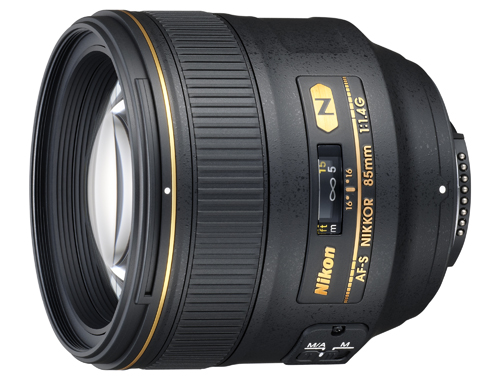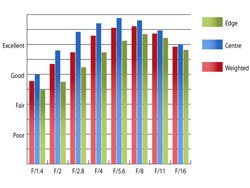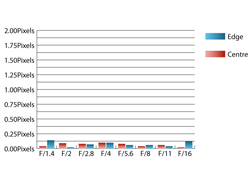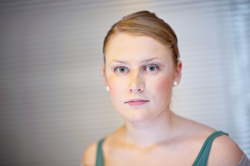Nikon AF-S Nikkor 85mm f/1.4G
This new short telephoto optic from Nikon is the latest addition in their revamped professional lens line up. It is the replacement for the revered 85mm f/1.4D, which garnered an enviable reputation for the image quality it can produce and most of all for the smoothness of it's out of focus blur. The new lens adds a silent focusing motor and Nikon's Nano Crystal optical coatings into the mix and can be had for around £1500. The older lens is still available new, from places that still have stock, for the discount price of around £890.
This focal length makes the lens ideal for portraiture, giving a slightly flattened, flattering perspective on a full frame body. The wide aperture also allows for very shallow depth of field, allowing you to isolate subjects from their background superbly, or even to try and soften the odd wrinkle here and there.
If the hefty price tag is beyond your reach, but you still fancy a lens at this focal length, Nikon's 85mm f/1.8D may be worth a look. This optic has a quick rear-focusing system and is lighter and more compact while still offering a respectable maximum aperture. This lens which has remained largely unchanged since the original non-D version can be picked up for around £300 new, but it lacks the silent focusing and nano crystal coat of the lens we will be looking at here.
Those on a budget, but not willing to compromise the maximum aperture may also wish to look at Sigma's 85mm f/1.4 HSM. This lens costs around £690 and has the same bright f/1.4 maximum aperture of the Nikon and a silent focusing motor.
To put the price into perspective, Canon's 85mm f/1.2L II is a half a stop faster with that huge f/1.2 maximum aperture, but costs around £1660, which is £160 more than this Nikon optic.
Nikon AF-S Nikkor 85mm f/1.4G: Handling and features
Weighing 595g, this new optic is around 45g heavier than its predecessor and feels very well put together as a result. It is still not what I would call a heavy lens though and it balances perfectly on my D700, with or without the MB-D10 grip attached. Just like with Nikon's other new professional prime lenses the build quality is superb. It is finished in a matt textured black finish with a gold ring near the filter thread denoting it's place in Nikon's professional line up.
Focusing is performed internally, and is very quick for a lens such as this with a large aperture. Care needs to be taken to ensure focus is accurate though, especially when shooting at maximum aperture, although the lens performs well enough for me, locking on accurately much of the time. Full time manual focus adjustments are possible due to the use of a silent wave focusing motor. The focusing ring gives a positive feel, making fine adjustments possible without too much hassle. A small distance scale window is located on top of the lens barrel and hyperfocal markings are provided for f/16 only. Unfortunately these markings are so close together that they are not easy to use at all.
Overall I really enjoyed using this lens. The difference the f/1.4 aperture makes to the brightness of the viewfinder needs to be seen to be appreciated. The aperture diaphragm is constructed from 9 rounded blades, which help this lens to produce images with very pleasing, soft out of focus blur.
Nikon AF-S Nikkor 85mm f/1.4G: Performance
With this lens' primary purpose being portraiture, I wasn't expecting extreme sharpness at maximum aperture. Despite this it still performs well, producing images with good sharpness in the centre. Stopping the lens down just one stop to f/2 increases the resolution in the centre dramatically, and this pattern continues as the lens is stopped down as far as f/5.6, where the lens performs excellently from edge to edge.
Peak resolution across the frame is achieved at f/8, where the centre sharpness has dropped a little, but the resolution towards the edges exceeds excellent on our scale. Beyond this, at smaller apertures diffraction begins to affect the resolution, but only a little, with images still showing excellent levels of sharpness in the centre at f/16.
A short telephoto prime such as this doesn't need the exotic low dispersion glass found in zoom lenses and super-telephotos to control chromatic aberrations, as shown in the results for this optic. The levels of colour fringing are so minute that Imatest barely recorded anything. At their worst they cover an area of 0.14 pixel widths at f/1.4, which will be difficult to spot, even with a fine toothed comb.
As I expected for a lens with a wide aperture like this, falloff of illumination towards the corners is quite pronounced at maximum aperture. At f/1.4 the corners are 2.37stops darker than the image centre, which can be quite noticeable. Although not technically perfect I like the vignetting effect for portraiture, as it can draw attention to the subject of the image. Stopping down to f/2 reduces the amount of falloff visible, but it can still be quite noticeable as the corners are 1.53stops darker than the image centre. Stopping down to f/2.8 results in visibly uniform illumination across the image area.
A little barrel distortion is present as I would expect from a lens with a wide aperture such as this. The level is quite low with Imatest detecting 0.7% barrel distortion. The distortion pattern is a little peculiar, with straight lines near the centre appearing almost straight, but with a visible increase in the amount of curvature towards the corners of the image area. Although this might make it a little more difficult to correct in image editing software afterwards, the level of distortion is so low that it should rarely even be noticeable, never mind cause an issue.
Just as with Nikon's other lenses equipped with their Nano Crystal optical coatings, ghosting an flare is kept to a minimum. I noticed a slight loss of contrast when shooting straight into the light, but otherwise the lens rewarded me with sharp, contrasty images under a wide range of lighting conditions. A deep circular plastic hood is supplied with the lens, which does an excellent job of keeping unwanted light off the front element.
Nikon AF-S Nikkor 85mm f/1.4G: Verdict
As is often the case, there is much more to how a lens performs than the resolution alone. In this case, Nikon's new 85mm f/1.4 certainly proved itself capable of producing images of very high resolution when stopped down a little.
Even wide open, the images produced by this optic are more than fit for purpose. In the centre the resolution is still good, and the falloff to out of focus is very smooth and soft, leading to very flattering images. Also, on the plus side, the lens is able to focus accurately enough to make the bright maximum aperture useful, even if a little care has to be taken from time to time.
Although the price tag may seem steep at £1500 for a fixed lens, you get what you pay for in many cases. In this case, if you need the ultimate in Nikon compatible portrait telephoto lenses then it just may well be worth stumping up the extra pennies.
 |
| It's a superb lens for portraiture. |
 Good resolution performance
Good resolution performance Beautiful out of focus blur
Beautiful out of focus blur Excellent build quality
Excellent build quality Negligible levels of CA
Negligible levels of CA Good resistance to flare and ghosting
Good resistance to flare and ghostingNikon AF-S Nikkor 85mm f/1.4G: Cons
 Maybe a touch pricey, but you get what you pay for
Maybe a touch pricey, but you get what you pay for| FEATURES |  |
| HANDLING |  |
| PERFORMANCE |  |
| VALUE |  |
| OVERALL |  |
Nikon AF-S Nikkor 85mm f/1.4G: Lens specification
| Price | £1,500.00 |
| Contact | www.nikon.co.uk |
| Filter size | 77mm |
| Format | Full-frame |
| Construction | 10 elements in 9 groups |
| Angle-of-view | 28˚30’ (18˚50’ with Nikon DX format) |
| 35mm equivalent focal length (on APS-C body) | 127.5m |
| Internal focusing | Yes |
| Image stabilisation | No |
| Minimum focus | 85cm |
| Maximum aperture | f/1.4 |
| Minimum aperture | f/16 |
| Weight | 595g |
| Size | 86.5 x 84mm |
| In the box | Lens Pouch CL-1118, Lens Hood HB-55 |
The Nikon AF-S Nikkor 85mm f/1.4G costs around £1500 and is available from Warehouse Express here:
Nikon AF-S Nikkor 85mm f/1.4G
Add your message
Login required
Please login here or if you've not registered, you can register here. Registering is safe, quick and free.
Please login here or if you've not registered, you can register here. Registering is safe, quick and free.
photodo Stats
1102 lenses
428 MTF tests
74 in-depth photodo reviews
100+ users join each day
Help the lens community by reviewing or rating a lens today via our lens search
428 MTF tests
74 in-depth photodo reviews
100+ users join each day
Help the lens community by reviewing or rating a lens today via our lens search
Latest Lens Reviews
- Chinon 28mm f/2.8 Vintage Lens Review
- Canon EF 70-200mm f/4L IS II USM Lens Review
- Samyang AF 85mm f/1.4 EF Review
- Sigma 70mm f/2.8 DG Macro Art Review
- Samyang AF 24mm f/2.8 FE Review
- Meike 50mm f/1.7 Review
- Tamron 70-210mm f/4 Di VC USD Review
- Lensbaby Burnside 35mm f/2.8 Review
- Asahi Super Takumar 50mm f/1.4 Review
- Asahi Super-Multi-Coated Takumar 135mm f/3.5 Review





